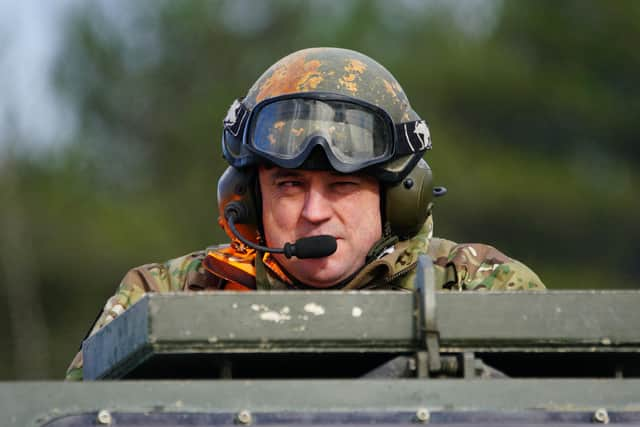Ben Wallace’s departure is a result of NATO’s utter impotence - Patrick Mercer
Ben Wallace: the most outspoken supporter of embattled Ukraine, the man whose plans and stratagems have dominated British military and foreign policy to counter Russia since well before the invasion of Ukraine.
Now, some would say this was because his hopes to become Secretary General of NATO had been thwarted whilst others believe that his recent, unguarded comments about Kiev have undermined his credibility. It’s true, on July 12 he did say that “…whether (Ukraine) likes it or not people want to see gratitude,” in terms of aid from the NATO allies. But, rather than a biting slap down, I see this more as a sign of exhausted exasperation from a man who has given his all.
Advertisement
Hide AdAdvertisement
Hide AdNo, I know and respect Ben Wallace and I believe that his departure is a result of something bitterly disappointing for him, something far more important than his own hopes: the utter impotence of NATO.


I’ll pull no punches: I believe Wallace resigned straight after the catastrophic NATO summit in Vilnius not because he had done his stint, but because he realised that the alliance had callously let down the people of Ukraine.
It was clear that President Zelensky had great faith that the Vilnius conference would culminate in a concrete sign or agreement that his country would be guaranteed membership once the shooting was over.
He even launched Kiev’s long delayed ‘spring’ offensive to show that it was only a matter of time before Ukrainian territory would be rid of its invaders and conditions would be set for Kiev to join the alliance.
Advertisement
Hide AdAdvertisement
Hide AdWhilst that offensive has so far achieved very little beyond thousands of Ukrainian casualties and the destruction of freshly delivered Western armour, guns and drones it has certainly demonstrated Kiev’s resolve. But its slow progress has also opened fissures.
Not unreasonably, when quizzed by the Allies about the offensive’s lack of progress, Kiev’s generals have angrily pointed out that the West hasn’t provided the right equipment nor enough of it.
To rub salt into the wound, Western pundits have even suggested that any attack without air cover was bound to fail, only to get the acid reply that Kiev has been demanding lethal F16 fighter bombers for months with no result.
All of this is set against the accession to NATO of Finland and now, after months of delay caused by Turkey, Sweden. Whilst the alliance has trumpeted its own expansion, Kiev must be asking what these countries bring to the party. They certainly have hardware and troops, but, as neutrals, neither has any combat experience and will require extensive training before they become effective in any contest against the world’s most battle hardened major power - Russia.
Advertisement
Hide AdAdvertisement
Hide AdUkraine, of course, has plenty of experience and would be hugely useful to NATO, but few are in any doubt that admitting her whilst fighting continues would provoke the next world war.
So, at Vilnius the Allies tried to soothe President Zelensky by the much publicised creation of the NATO-Ukraine Council, yet this is nothing more than a new name for the NATO-Ukraine Commission and a tired reaffirmation that “Ukraine will become a member of NATO when Allies agree and conditions are met.”
In other words, Kiev’s case has progressed not one inch from when she was promised membership back in 2008.
Now, it’s hard to predict what the eventual ceasefire will look like in Ukraine, but one thing is certain - Russia won’t collapse and she’ll still be a threat. That’s why, of course, Ukraine needs security guarantees, despite NATO’s worrying disarray.
Advertisement
Hide AdAdvertisement
Hide AdLook at the row over F16s jet fighters, for instance. America will be the main provider, but has said that it’ll be many months before they are ready.
To hurry things along, Ben Wallace announced that Britain would start F16 pilot training almost immediately, but he didn’t clear this with Washington and it’s claimed that that was the reason the White House scuppered his chances to become NATO’s Secretary General.
Meanwhile, Wallace teamed up with France to send long range Storm Shadow cruise missiles to Kiev. Again, Washington was angry as this gave Ukraine the means to fire Western supplied weapons deep into Russia which crossed another of their red lines.
So, with Turkey and Greece at each other’s throats, Germany in political turmoil and many members dodging the column on increasing defence spending, it’s easy to see why Russia tested the Allies’ determination even further last Monday.
Advertisement
Hide AdAdvertisement
Hide AdAs part of Moscow’s missile assault on Ukrainian ports, weapons were fired at Reni, a small but important anchorage just across the Danube from Romania.
And that’s the point: Romania’s a vital ally of Ukraine. Through her territory flows much of Western provided materiel that Kiev needs to sustain her fight and she’s one of the few front line members of NATO.
Now, Allied satellites would have detected the launch of those missiles and assessed that they were speeding towards Romania: powerless to intercept such fast moving projectiles in flight, there must have been some very uncomfortable moments for NATO commanders until they exploded dangerously close to Romania.
Patrick Mercer is a former MP for Newark and Army colonel.